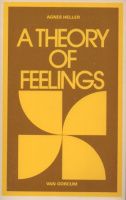kategóriák
- Közlekedés ajánlójegyzék
- Szocreál ajánlójegyzék
- Reklám ajánlójegyzék
- Fotó ajánlójegyzék
- Kínai-japán ajánlójegyzék
- Szentkép ajánlójegyzék
Új árakkal! - Új szentkép ajánlójegyzék II.
- 12 érdekes régiség
 Könyv
Könyv
 Bibliofilia
Bibliofilia
 Régiség
Régiség
 Metszet
Metszet
 Térkép
Térkép
 Fotó
Fotó
 Papírrégiség, Aprónyomtatvány
Papírrégiség, Aprónyomtatvány
 Plakát
Plakát
- Cirkusz
- Modern grafika
- Szocreál
- NER Irodalom
- Egyéb
kosár
üres a kosár
nincs bejelentkezve
Heller, Agnes : A Theory of Feelings
- leírás
- további adatok
Series: Dialectic and Society.
This book is the second of a series in which the author tries to build up a consistent Marxist social anthropology. Its fundamental thesis is that the false contrast of feeling versus reason should be abolished, that even the relative functional independency of feeling cannot be understood in absolute opposition to reason. The first part of the book: "The phenomenology of feelings" begins with a definition of feeling. It proceeds from this to the principles with the help of which feelings could be divided into classes, criticizes other divisions and gives its own, and makes an attempt at the complete system of division of feelings. The next chapter deals with the "learning process" of feelings from which the book turns to the problem of feelings and values, the problem of the evaluation of feelings and - as a conclusion of the first part - to the so-called "particular" versus "individual" feelings. The second part is a contribution to the sociology of the feelings, and the author emphasizes that it is only a contribution, not a complete historical sociology of the problem. First of all it tries to establish the general "historical dynamics" of the bourgeois world of feelings, it analyzes the "feeling household" in some detail, deals further on with the problem called the "abstraction" of bourgeois feelings and gives a short analysis of the present historical developments.
This book is the second of a series in which the author tries to build up a consistent Marxist social anthropology. Its fundamental thesis is that the false contrast of feeling versus reason should be abolished, that even the relative functional independency of feeling cannot be understood in absolute opposition to reason. The first part of the book: "The phenomenology of feelings" begins with a definition of feeling. It proceeds from this to the principles with the help of which feelings could be divided into classes, criticizes other divisions and gives its own, and makes an attempt at the complete system of division of feelings. The next chapter deals with the "learning process" of feelings from which the book turns to the problem of feelings and values, the problem of the evaluation of feelings and - as a conclusion of the first part - to the so-called "particular" versus "individual" feelings. The second part is a contribution to the sociology of the feelings, and the author emphasizes that it is only a contribution, not a complete historical sociology of the problem. First of all it tries to establish the general "historical dynamics" of the bourgeois world of feelings, it analyzes the "feeling household" in some detail, deals further on with the problem called the "abstraction" of bourgeois feelings and gives a short analysis of the present historical developments.
| állapot: |      |
| kategória: | Könyv > Filozófia > |
| kategória: | Könyv > Idegennyelvű könyvek > Angol nyelvű > |
| kiadó: | Van Gorcum Assen, 1979 |
| cikkszám / ISBN: | 0063116 |
| kötés: | fűzve |
| oldalszám: | 244 |
| könyv nyelve: | angol |









 Telefon:
Telefon: E-mail:
E-mail:







